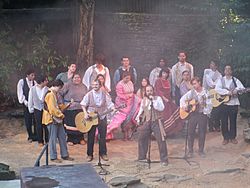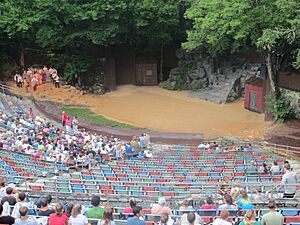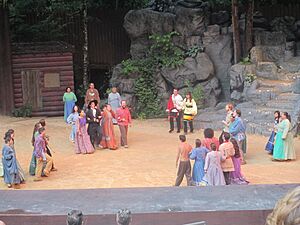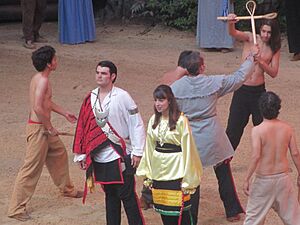Unto These Hills facts for kids
Quick facts for kids Unto These Hills |
|
|---|---|

The cast assembles for the drama, July 19, 2012.
|
|
| Written by | Kermit Hunter; Hanay Geiogamah; Pat Allee, Ben Hurst and Linda Hurst |
| Date of premiere | July 1, 1950 |
| Place of premiere | Cherokee, North Carolina |
| Genre | Outdoor historical drama |
Unto These Hills is a special outdoor play. It happens every summer at the Mountainside Theatre in Cherokee, North Carolina. The theatre has 2,800 seats! It's one of the oldest outdoor plays in the U.S. Only two others, The Lost Colony and The Ramona Pageant, have been around longer.
The first version of this play was written by Kermit Hunter. It opened on July 1, 1950, and was very popular. The play tells the story of the Cherokee people from the Eastern region. It covers their history up to 1838. This was when U.S. forces sadly forced them to move. This event is known as the Trail of Tears. The Cherokee were moved to Indian Territory, which is now Oklahoma.
The play features important Cherokee historical figures. These include Sequoyah, Junaluska, and Chief Yonaguska. It also includes William Holland Thomas. He was adopted by Chief Yonaguska. William Holland Thomas was the only white chief of the Cherokee. The play also includes figures from Cherokee stories. These are Selu the Corn Mother and Kanati the Great Hunter.
Contents
The Play's History
A group called the Western North Carolina Associated Communities (WNCAC) wanted to help their area. They hoped to bring more visitors and jobs to western North Carolina. They saw how successful The Lost Colony was. This was another historical outdoor play. So, the WNCAC decided to create a similar play. Their play would be about the Eastern Band of Cherokee Indians (EBCI).
When Paul Green, who wrote The Lost Colony, was busy, they asked Kermit Hunter. He was a student at UNC. Hunter wrote the new outdoor drama. The Mountainside Theatre was built just for this play. The first show was on July 1, 1950. It was an instant hit! More than 100,000 people saw it in its first year.
The play has been performed for over 60 years. The Cherokee Historical Association owns and runs the theatre. Shows happen Monday through Saturday evenings.
Famous People in the Play
Many famous people have acted in Unto These Hills.
- Michael Rosenbaum played Lex Luthor on Smallville.
- Adam Richman hosted Man v. Food on the Travel Channel.
- Polly Holliday was in the 1970s TV show Alice.
- Ben L. Jones was an actor and former U.S. Representative. He was a regular on The Dukes of Hazzard.
Changes to the Script
In 2006, the EBCI Tribal Government hired Hanay Geiogamah. He is a writer and director of Native American plays. He was asked to update the script. This was the first full rewrite since the play started. Geiogamah was chosen to fix historical mistakes. He also aimed to get more Cherokee tribal members to act in the play.
Geiogamah wrote a new script and put on a show. But some tribal members did not like the new version. They felt it changed the Cherokee way of storytelling. They also missed the story of Tsali. Tsali is believed to have given his life. This was so some Cherokee people could stay in their homeland.
In 2007, the tribe hired Pat Allee and Ben Hurst to write a new script. Linda West made more changes in 2008. In 2009, fewer than 50,000 people saw the show. This was about half the number from earlier years. John Tissue, who directs the Cherokee Historical Association, thought money problems were the reason.
The 2010 production was credited to Linda Squirrel. Eddie Swimmer, a Cherokee, directs the play. By 2010, over six million people had seen the show!
In 2015, the original 1950 script by Kermit Hunter was brought back. Some changes were made to make it more historically correct. Many people were happy to see the original version again.
In 2020, the play's season was canceled. This was because of the COVID-19 pandemic. It was the first time the drama did not have a season. The play returned in May 2021.
The Sequel Play
The Cherokee Nation asked Kermit Hunter to write a sequel. It was called The Trail of Tears. This play covered the time during and after the forced move to Indian Territory. That drama was performed at a large outdoor theatre. It was at the Cherokee Heritage Center in Oklahoma. It ran from 1969 to 2005.
Images for kids





